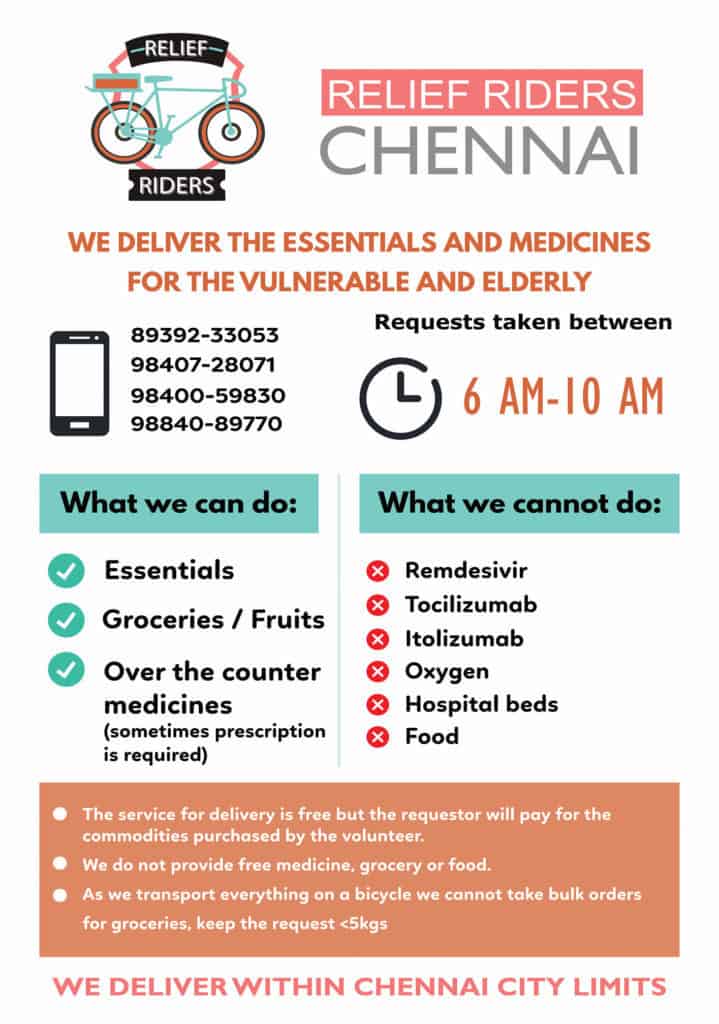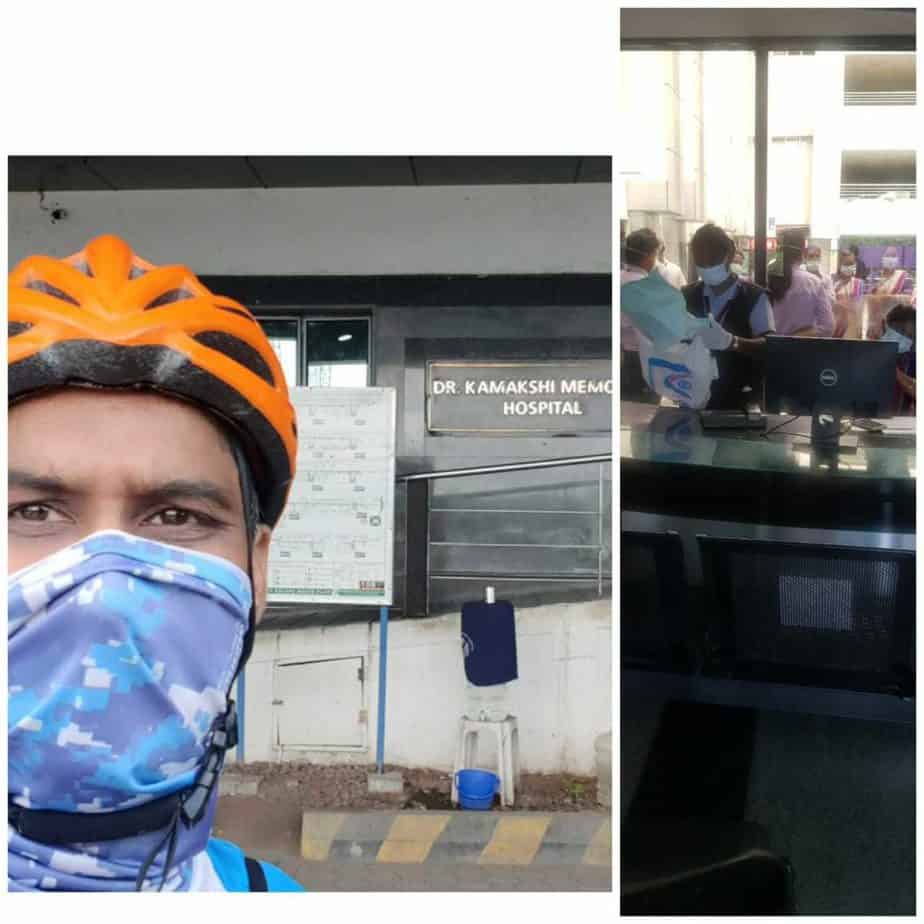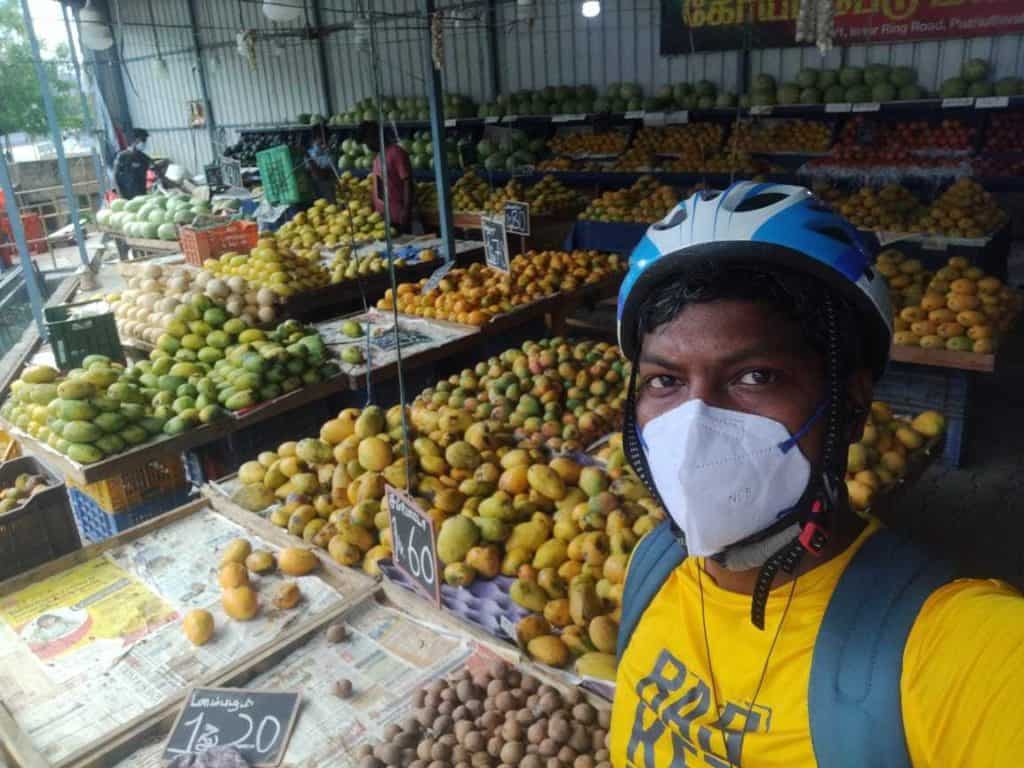Chennai has seen an unprecedented spike in COVID-19 cases in recent months. This has resulted in many individuals affected by the illness having to be hospitalised or placed in home isolation. During this time, individuals and families have found it difficult to access medicines, groceries and other essentials. Chennai’s cyclists have come together in this hour of need to provide this important service, free of cost to those in need.
The idea of Relief Riders originated from cyclists in Bengaluru and was later replicated by Chennai, Hyderabad, Mumbai and Jaipur cyclists. At the end of April, Felix John – Bicycle Mayor of Chennai- along with other cyclists came up with this concept of cyclists pitching in to help the city during the pandemic. Cyclists of the city came together with the promise of delivering medicines and essentials to the elederly and the vulnerable.
Forms were rolled out and volunteers joined the effort. In the first week, a Whatsapp group was created and we found out that amongst us, we even had some expertized doctors in the group. A core team was also formed to streamline our efforts, with regular check-ins via zoom meetings.
We have been doing this for three weeks now, fulfilling many requests across the city. At first we were just a group of 30 but with more members taking interest in the initiative, the riders are 105 strong at this time and growing.
Read more: COVID second wave in Chennai: What to do if you test positive
Division of work
What we can do and what we cannot do was clearly defined after having discussions within the volunteer group. Banners and logos were created and four telephone numbers listed as contact points. These four members get the requests from affected families and place them in the Whatsapp group. Once requests are received, respective Chennai area volunteers would claim these requests and start working on completing them in a timely manner. There are also three core team members managing an Excel database and ensuring that all requests are addressed. A standard SOP was also prepared with rules for managing Whatsapp group messages.
Deliveries can begin as early as 6 am. Some of us have been doing 6-7 deliveries a day. As the cases have increased we have been seeing more requests lately. We plan to continue this effort for as long as there is a necessity.
In order to ensure that we do our bit for society, while maintaining safety at all times, we also determined a standard safety protocol of wearing a double mask along with usage of gloves and sanitizers during cycle rides. We do drop-offs and pickups at the doorstep. We ensure that we enter our homes only after a shower and change frequently.
One of my first requests as a rider was to drop off some belongings to a person admitted in Kamakshi Hospital with COVID-19. His family had tested positive and were under home quarantine in Nanganallur. While I had some apprehension, I wanted to help the family who had not been able to communicate with their loved one in the hospital. I called the family and informed them that I would be picking the parcel up the next morning. Their exact location was shared with me.
The following morning, they had kept the bag outside their residence and I picked it up. The next part of the task was to ride till Kamakshi Hospital and enter the COVID Ward. To my relief, the hospital was well-organised and I was able to handover the bag at the COVID Ward Reception. I took a picture of the drop-off to share with the family.
– Narayanan G
Read more: The second wave: All about the latest COVID testing, containment and vaccination protocol in Chennai
Most common requests
Needs among COVID-affected families usually revolve around:
- Delivering medicines for fever and cold
- Collecting medical reports from the scan centre and delivering to residence/hospital
- Delivering patients’ belongings from home to hospital
- Delivering fruits, vegetables and essential groceries to those under home quarantine
- Delivering cooked food
For any purchases, volunteers buy the products required and payment is done through GPAY by the recipient families. We ensure contactless delivery.
We do sometimes get frivolous requests and the riders determine what is essential and whether they will be able to fulfil these requests. For the most part, we have been able to reduce the stress on families under isolation or those who are alone during this time.
I work as a Human Resources executive and my working hours are flexible now; so, I am able to manage the deliveries before my work or when I get breaks in between. I have been doing other deliveries too with a group of bikers on most days. My family is supportive and understanding about the efforts being undertaken and I ensure that I take all safety precautions as well.
It is not always that those who reside the closest may be able to handle a request. Sometimes it so happens that we have to make long trips as well. I have even had to do a delivery that entailed travelling 25 kms one way to provide some essentials to a household.
– Shivaraju RM
Prior to the lockdown, it was easy for volunteers to provide support to the families as they could do it any time at their convenience. A recent challenge has emerged because of the terms of lockdown, under which it is necessary to complete the requests for groceries and other deliveries by 10 am; beyond 10 am, only delivery of medicines is permitted. Felix John has worked with the Chennai administration to provide the riders a letter/pass which we can use during our ride, while supporting affected families.
In addition to the deliveries, Relief Riders have also prepared a database of COVID hospitals, oxygen suppliers, food services and medicine shops and a group has worked to verify the authenticity of these sources. We have also started providing contacts of third party food services parties. Our group has built the database and we are sharing the same with affected families.
Riding on a hot summer day? Well, most cyclists are used to this as we take part in long rides and even in endurance races. We add more layers and masks when we stop for pick ups or drop offs but while riding, we do not use more gear so that we are able to bear the heat.
Also read:
- How to support efforts to help Chennai beat the COVID crisis
- Why are patients struggling to find hospital beds in Chennai?
[As shared with and transcribed by Aruna Natarajan, Staff reporter at Citizen Matters Chennai.]


